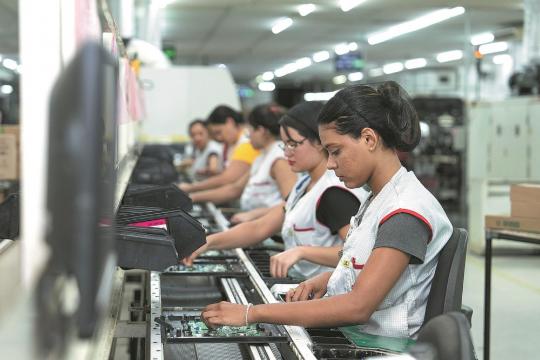Home appliance makers localize for Brazilian market
Chinese home appliance makers are expanding their footprint in Brazil and increasing investments in localized operations covering research and development, production and marketing, so as to tap into the immense development opportunities in South America's largest market.
Midea Group, one of the world's largest producers of appliances and industrial robots, said it will continue to increase its investments in product innovation, brand building and localization in Brazil, one of its most important overseas markets.
The company, headquartered in Guangdong province, held a groundbreaking ceremony for its new 700-million-yuan ($98.3 million) factory in Pouso Alegre in the Brazilian state of Minas Gerais last year.
Covering an area of over 70,000 square meters, the factory, which is Midea's third in Brazil, and produces refrigerators and washing machines, is now in trial operation.
With an annual production capacity of more than 1 million units, the plant integrates digital and innovative production technologies, and is expected to enhance Midea's competitiveness in the local market. Products made there will be sold locally and in other markets in South America.
The new facility joins Midea's other two factories in Brazil, one located in Manaus producing household air conditioners and microwave ovens, and the other in Canoas making commercial air conditioners.
"Our goal is to become one of the leading brands in the Brazilian refrigerator market within four years. Midea will provide Brazilians with more choices for intelligent home appliances and improve the quality of life of local consumers," said Wang Jianguo, vice-president of Midea Group.
Chinese consumer electronics maker TCL Technology Group has also intensified efforts to make forays into the Brazilian market, with a key focus on home appliances and photovoltaics, as part of a broader push to expand its global footprint.
Yue Haiping, general manager of the overseas marketing department's Brazil branch at TCL, said the company has huge growth potential in the Latin American country, and hopes to introduce more leading consumer electronics products to the Brazilian market and bring more choices to local consumers by leveraging its advantages in products, technology, supply chain and brand promotion.
The company has two manufacturing bases in the city of Manaus in Brazil's Amazonas state, where the local government has provided favorable tax policies. Yue said the annual production capacity of its TV factory has reached 3 million units, while its air conditioner factory, which was put into operation in 2022, can produce nearly 1 million units each year.
"We have more than 1,500 employees in Brazil. The localized manufacturing capacity is of great significance to expand TCL's business in the country as you learn more about the local market, and local consumers will also have a higher level of recognition and acceptance of brands and products," Yue said.
Felipe Hennel Fay, vice-president of SEMP TCL, said Brazilian consumers have an increasing demand for high-end electronic devices, especially large flat-screen TVs and premium refrigerators, air conditioners and washing machines.
SEMP TCL is a joint venture established by TCL and Brazilian home appliance manufacturer SEMP in 2016. It mainly targets the mid- to high-end market in Brazil.
Founded in 1942, SEMP launched Brazil's first TV in 1951 and has laid a solid foundation in understanding the Brazilian market and building a local distribution network, which was exactly what TCL needed in exploring the local market.
Fay said there is tremendous growth potential in fields like air conditioners, refrigerators and washing machines in Brazil, adding that apart from the consumer electronics industry, Chinese companies can further explore development opportunities in the country's automobile segment.
He added there will be plenty of new opportunities to be jointly explored by Chinese and Brazilian enterprises in terms of the green energy transition and the rapid development of the internet of things and 5G technologies.
Liang Zhenpeng, an independent consumer electronics analyst, said that in the past, most Chinese enterprises adopted the OEM or original equipment manufacturer model, but nowadays they tend to build their own brands to participate in global competition.
He said setting up production bases in Brazil not only brings China's advanced manufacturing, research and development as well as management capabilities to the local market, but creates job opportunities for locals and enhances the global competitiveness of Chinese enterprises.
China's domestic home appliance market is almost saturated, so major players should accelerate steps to expand in emerging markets such as South America and Africa, and seek new sources of revenue and long-term development, he added.
Zhao Meimei, assistant president of Beijing-based market consultancy All View Cloud, said building a sound global industrial chain and enhancing operational capacity in the overseas market will help Chinese home appliance companies utilize global resources, reduce costs and improve management efficiency.
Brazil is the largest market in South America, and local consumers have exhibited growing demand for high-end home appliance products, she said.

